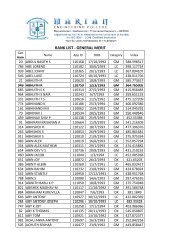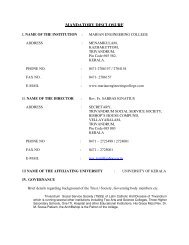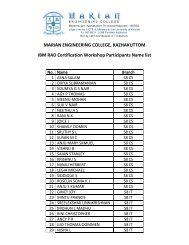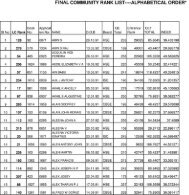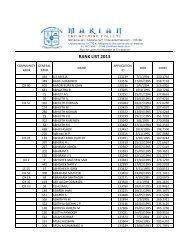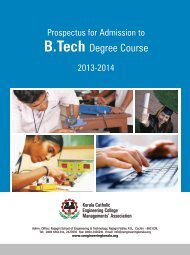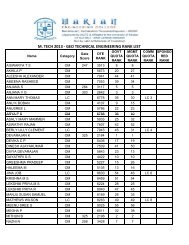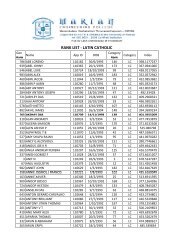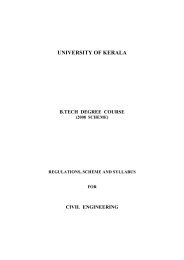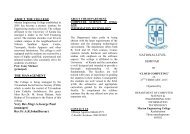UNIVERSITY OF KERALA - Marian Engineering College
UNIVERSITY OF KERALA - Marian Engineering College
UNIVERSITY OF KERALA - Marian Engineering College
You also want an ePaper? Increase the reach of your titles
YUMPU automatically turns print PDFs into web optimized ePapers that Google loves.
B.Tech Comp. Sc. & Engg., University of Kerala 29<br />
08.304 ELECTRONIC CIRCUITS (R F) 2 – 1 – 0<br />
Module I (12 hours)<br />
Design and analysis of Rectifiers, Filters, Clippers, Clampers, Regulators, Differentiators, Integrators-RC<br />
circuits-response of high pass / low pass RC to sine wave, pulse and square wave inputs- principle of<br />
operation of inverters, uninterrupted power supplies, switched mode power supplies<br />
Module II (13 hours)<br />
Transistor amplifiers- classification – small signal analysis – voltage divider bias – emitter follower<br />
configuration- feed back configurations- RC phase shift, wein bridge, Colpitts, Hartely oscillator( No<br />
derivations), Multivibrators- monostable, bistable and astable- 555 timer and applications ( No derivations)<br />
Module III (14 hours)<br />
Operational Amplifiers, Block diagram, characteristic features of OP Amps, ideal OP Amps, common mode<br />
and difference mode- summing amplifier, differential amplifier, inverting, non inverting amplifiers. Active<br />
filters, Applications, Chebyshev and Butterworth filters, Low pass Butterworth Filter, High pass Butterworth<br />
Filter, Band Pass and Band rejection filters, Oscillators- Wein Bridge and Phase shift Oscillators<br />
Text Books:<br />
1. Electronic Devices and Circuits Theory – Boylestead and Nashelky, PHI<br />
2. Op-amp and Linear Integrated Circuits – Gayakwad, 4 th Edn., Pearson Education<br />
Reference Books:<br />
1. Electronic Circuits – R.D. Sudhaker Samuel and V Nattarsu, Sanguine Technical Publishers<br />
Internal Continuous Assessment (Maximum Marks-50)<br />
25 Marks - Tests (minimum 2)<br />
15 Marks - Assignments (minimum 3) such as home work, problem solving, literature survey, seminar,<br />
term-project, hardware/software/simulation exercises, etc.<br />
10 Marks - Regularity in the class<br />
University Examination Pattern<br />
PART A: Short answer questions 10 x 4 marks=40 marks<br />
All questions are compulsory. There should be at least three questions<br />
from each module and not more than four questions from any module.<br />
PART B: Descriptive/Analytical/Problem solving questions 3 x 20 marks=60 marks<br />
Candidates have to answer one question out of two or two questions<br />
out of four from each module.<br />
Maximum Total Marks: 100



